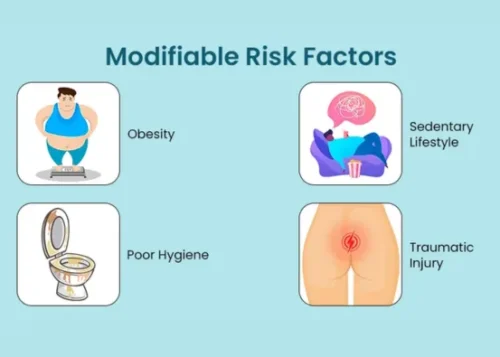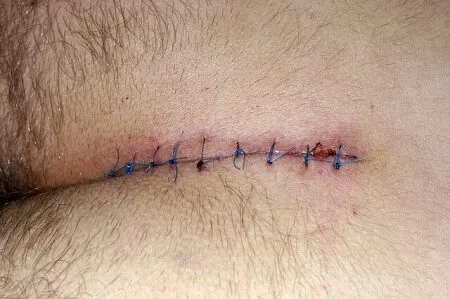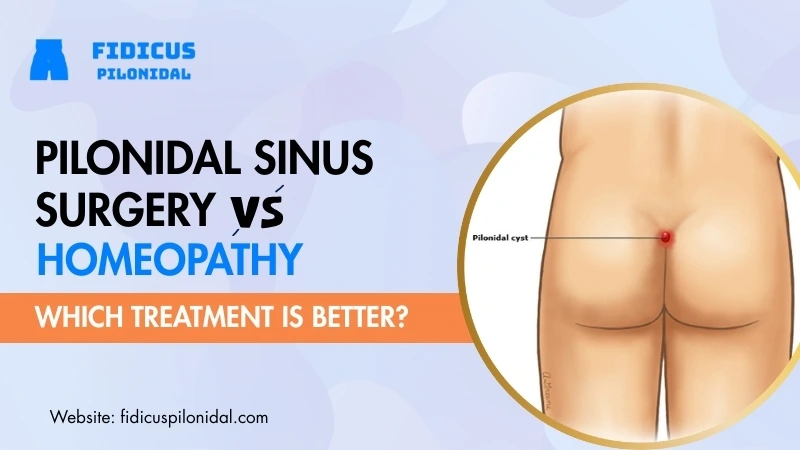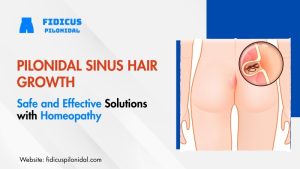Pilonidal sinus is a chronic condition that causes pain, swelling, and recurrent infections near the tailbone. For patients, choosing the right treatment often comes down to pilonidal sinus surgery or homeopathy treatment for pilonidal sinus. Surgery is the conventional approach, where the sinus tract is removed through an operation. While effective in some cases, surgery involves hospital stay, high pilonidal sinus surgery cost, painful recovery, and the risk of recurrence.
On the other hand, pilonidal sinus treatment in homeopathy is non-surgical, safe, and aims to address the root causes like infection, pus formation, and inflammation. Instead of just removing the tract, homeopathy strengthens the body’s natural healing, reduces recurrence, and offers long-term relief without side effects. With guidance from an experienced homeopathy doctor for pilonidal sinus, patients can avoid the complications of surgery and manage their condition holistically.
Understanding Pilonidal Sinus
A pilonidal sinus is a small tunnel or cavity that develops beneath the skin near the tailbone, at the top of the buttocks. The word “pilonidal” literally means “nest of hair,” which explains why this condition is closely associated with hair growth. The sinus often contains hair, debris, and pus, which can lead to painful swelling and infections.
Although it may look like a minor skin problem in the beginning, a pilonidal sinus can turn into a chronic and recurring condition if left untreated. It is most common in young adults, especially men, but women can also be affected.
Causes and Risk Factors of Pilonidal Sinus
A pilonidal sinus doesn’t appear overnight. Multiple factors contribute to its onset and recurrence:
- Ingrown Hair: Hair strands that penetrate the skin can trigger infection and sinus formation.
- Friction & Pressure: Continuous sitting on hard surfaces increases pressure, making the area prone to infection.
- Sweating & Poor Hygiene: Moisture buildup creates a perfect environment for bacteria.
- Obesity: Excess body weight increases friction and sweating.
- Genetic Predisposition: Family history may play a role in recurring pilonidal sinus.
Understanding these factors is crucial because proper treatment must address the root cause—not just the symptoms.

Pilonidal Sinus Surgery – An Overview
Pilonidal Sinus Surgery is the conventional treatment that involves physically removing the sinus tract. There are different surgical methods, such as excision with open healing, flap surgery, or laser surgery.
Advantages of Surgery:
- Removes the visible sinus tract and infected tissue.
- Offers temporary relief from severe abscesses and infections.
- Can be a lifesaving measure in advanced cases where infection spreads.
Disadvantages of Surgery:
- Recurrence Rate: Despite surgical removal, studies show that recurrence happens in 20–40% of patients.
- Painful Recovery: Patients usually face discomfort, pain, and difficulty in sitting, walking, or bending for weeks.
- Risk of Complications: Surgical wounds may develop infections, delayed healing, and in some cases, noticeable scarring.
- Lifestyle Impact: Recovery often requires dressing changes, hospital follow-ups, and long rest periods, which can disrupt work, studies, and daily life.
- Psychological Stress: Patients often feel anxious about recurrence and may fear undergoing surgery again.
Pilonidal Sinus Surgery Cost
The pilonidal sinus surgery cost in India usually ranges between ₹30,000 and ₹70,000, depending on hospital facilities, type of surgery, and post-operative care. However, recurring episodes may require repeat surgeries, making it an expensive long-term option.

Pilonidal Sinus Treatment in Homeopathy
Pilonidal sinus treatment in homeopathy focuses on treating the individual as a whole, not just the infected sinus tract. Homeopathy aims to reduce pain, prevent pus formation, and heal the sinus naturally.
Why Choose Homeopathy Treatment for Pilonidal Sinus?
- Non-Surgical Approach: No cuts, stitches, or hospitalization.
- Addresses the Root Cause: Prevents recurrence by improving immunity and healing tendency.
- Safe & Gentle: No harmful side effects or antibiotic dependency.
- Personalized Treatment: Remedies are chosen according to the patient’s constitution, lifestyle, and symptoms.
- Cost-Effective: Unlike costly surgeries, homeopathy provides affordable, long-term relief.
Commonly Used Remedies (for awareness only):
- Silicea: Known for its deep healing properties, Silicea helps expel pus, hair, and trapped debris from the sinus. It strengthens natural immunity and is highly effective in preventing recurrent abscesses and chronic pilonidal sinus.
- Hepar Sulph: Best suited for acute infections, this remedy reduces pain, tenderness, and swelling. It works well when the area is extremely sensitive to touch and helps control pus formation in the early stages.
- Myristica Sebifera: Often called the “homeopathic knife,” it promotes natural drainage of abscesses, reducing the need for surgical intervention. It is particularly effective in painful, inflamed boils or sinus abscesses about to burst.
- Calcarea Sulph: This remedy is useful for long-standing cases with continuous pus discharge and slow wound healing. It helps tissues recover properly, prevents further tract formation, and reduces the risk of recurrence.
Note: The remedies listed above are for educational purposes only. The correct medicine, dosage, and potency vary for each patient and should always be prescribed by a qualified homeopathy doctor after proper consultation.

Surgery vs Homeopathy – A Detailed Comparison
When it comes to treating pilonidal sinus, both surgery and homeopathy are considered. However, their approach, recovery, and long-term outcomes are very different. Let’s look at the key points of comparison:
- Invasiveness:
Pilonidal sinus surgery requires cuts, stitches, and sometimes hospitalization. On the other hand, homeopathy treatment for pilonidal sinus is completely non-invasive—no cuts, no wounds, and no surgical trauma. - Recurrence:
Despite undergoing surgery, recurrence is common, with reports showing it can return in 20–40% of cases. Homeopathy works differently by addressing the root cause of infection and the body’s tendency to form abscesses, making recurrence far less likely. - Cost:
The pilonidal sinus surgery cost in India ranges between ₹30,000 and ₹70,000, and repeat surgeries make it even more expensive. In comparison, homeopathy is affordable and provides long-term results without financial strain. - Side Effects:
Surgery carries risks of infection, scarring, and complications from anesthesia. Homeopathy has no side effects, as remedies are safe, natural, and suitable for all age groups.
Clearly, when compared point by point, homeopathy treatment for pilonidal sinus emerges as a safer, cost-effective, and permanent solution, while surgery remains a temporary and invasive option.
Patient Perspective – Which Treatment Works Better?
Most patients who undergo surgery initially feel relieved but often return with recurrence after a few months or years. This cycle of pain, antibiotics, and repeated operations can be frustrating and financially draining. On the other hand, patients who choose homeopathy treatment for pilonidal sinus experience:
- Gradual but steady improvement in pain, swelling, and discharge
- Reduced dependency on painkillers and antibiotics
- Lower chances of recurrence in the long term
- Better overall health and immunity
Why Homeopathy is the Better Choice
Medical data shows that pilonidal sinus has a high recurrence rate after surgery, which means surgical removal is not a permanent cure. Homeopathy, however, focuses on constitutional treatment, which makes the body less prone to developing abscesses and sinus tracts in the future.
Therefore, homeopathy treatment for pilonidal sinus is not only effective but also the best long-term solution for patients who want to avoid surgery and live without fear of recurrence.
Conclusion
When comparing Pilonidal Sinus Surgery and pilonidal sinus treatment in homeopathy, it is clear that homeopathy provides safer, more affordable, and more permanent results. Surgery may appear as a quick fix, but the high recurrence, painful recovery, and heavy cost make it less reliable.
At Fidicus Pilonidal, we specialize in homeopathy treatment for pilonidal sinus, offering individualized care that heals from the root and prevents recurrence. Don’t let surgery hold you back—choose natural, effective, and lasting relief with homeopathy.






